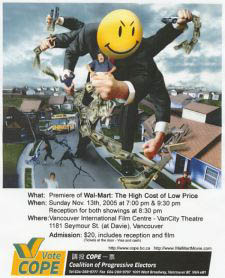 |
 Click on picture to enlage poster |
Sunday, at 7 p.m. at the VanCity Theatre, director Robert Greewald’s much-praised and controversial new film Wal-Mart - The High Cost of Low Price will première in Vancouver as a benefit screening for Vancouver’s COPE municipal party.
You know Wal-Mart’s inglorious history. Child exploitation. Earlier this year, Wal-Mart Stores agreed to pay $135,540 to settle federal charges in the U.S. that it violated child labour laws in Connecticut, Arkansas and New Hampshire.
Wal-Mart’s culture of crime and greed. In March of this year, only eight short months ago, Wal-Mart paid $11 million to settle charges that it employed hundreds of illegal immigrants to clean its stores across the United States.
Workers have been illegally fired for trying to form a union, and Wal-Mart spends millions to thwart workers basic rights, giving its union-breaking staff priority on resources (like corporate jets) over even higher-placed managers. In 2000, meat cutters at a Wal-Mart in Texas voted for the union — and Wal-Mart promptly violated the law by shutting down the meat-cutting department in the store and, for good measure, closed every other meat-cutting department in 179 other stores across the U.S. and Canada, just to make sure they had stamped out any smell of unionism.
And let’s not forget Wal-Mart’s shuttering of their Jonquierre, Québéc store, in May of this year, after its employees received union certification. A former employee at that store has filed a class-action suit in the Québéc Supreme Court claiming that Wal-Mart, in closing the store, “violated the rights of its workers” by breaching the Canadian Charter of Rights and Freedoms, which guarantees freedom of association to all citizens.
Then there’s Wal-Mart’s wage policies, which deny its workers the basic right to a living wage, not to mention the off-the-clock work they force on their employees, and unequal pay and treatment to which they subject their employees. Wal-Mart’s discriminatory policies in regards of their female staff have resulted in the largest workplace-bias lawsuit in U.S. history.
You know the story: poverty-level wages, with a staff turnover rate of 50% a year; destruction of local businesses due to predatory pricing (an Iowa State University study found that in the first decade after Wal-Mart arrived, the state lost 111 men’s and boys’ apparel stores, 116 drug stores, 153 shoe stores, 158 women’s apparel stores, 161 variety stores, 293 building supply stores, 298 hardware stores, and 555 grocery stores); numerous labour law violations, ranging from illegal spying on employees and falsification of time cards to avoid paying overtime to fraudulent record keeping and illegal firings for union organizing; the record-holder for the most suits filed against a U.S. company by the Equal Employment Opportunity Commission (Wal-Mart had to pay a $750,000 fine for blatant discrimination in Arizona against the disabled. The judge even ordered Wal-Mart to air commercials confessing their guilt); and more, much more.
But you don’t know the whole story. You won’t gain a true insight into Wal-Mart corporate practices until and unless you attend this Sunday evening’s screening of Wal-Mart — The High Cost of Low Price. Until you hear for yourself the shattering experiences of the current and former Wal-Mart employees Greenwald interviewed, this story will be little more than words on a screen. Sunday evening. See you at the VanCity theatre.